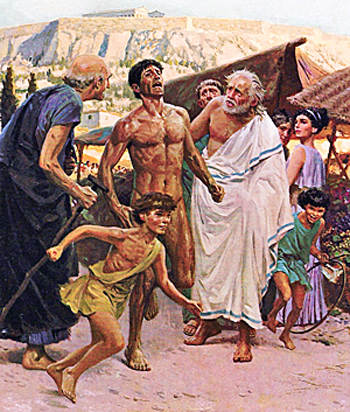marathon-; and related entries ending in -athon, -thon
(Greek: derived from an ancient villiage in Greece, northeast of Athens; as a result of an important Greek victory over the Persians in 490 B.C.)
Some hackathons are intended simply for educational or social purposes; in other situations, the objectives are to create practical software and electronic machines.
2. Etymology: a compilation of hack, in this application, "exploratory programming" + marathon, "a long period of time or challenging activities".Athens had sent for help from Sparta by sending a professional runner named Phidippides (fih DIP ih deez), or Pheidippides, to run a hundred-mile distance because haste was essential.
No help arrived; so, the 9,000 Athenian army led by Miltiades made a surprise attack against the Persians at Marathon.
According to the later Athenian report, the Athenians lost 192 men in the battle, while the Persians supposedly lost 6,400 men.
Meanwhile, the Athenians waited for news of the battle because they expected to see fleeing Greek soldiers being pursued by Persians and then the city would be burned and they themselves killed or enslaved.
The Athenian army, victors at Marathon, knew well that their people were in agonizing suspense and so they sent a runner back to the city with the great news. According to tradition, it was the same Phidippides who had run for help from Sparta and he ran from Marathon to Athens at top speed; reached the city, barely able to gasp out the news of victory, and died.
The distance from Marathon to Athens was a little over 26 miles and in honor of this run by Phidippides, "marathon races" are run as sporting events over distances of 26 miles, 385 yards; however, no one knows how long it took him to run the very first marathon.

This illustration represents Pheidippides, the Marathon runner who delivered the message of the Greek victory over the Persians to the Athenians.
A marathon is also considered a test of courage and character as well as physical endurance.
Before the running of the marathon became popular as a mass-participation sport in the 1970s, there were many who thought that such an activity required superhuman strength.
In the 1972 Munich, German, Olympics, the most memorable aspect of the marathon took place near the end of the race when a West German student, wearing a running uniform with the number 72, came out of the tunnel onto the stadium track ahead of leader Frank Shorter and pretended to be winning the race and got half-way around the track before he was stopped and removed by officials.
There were marathon sessions of negotiating with union leaders and company administrators which were not resolved for over a month.
Yesterday, Professor Martin had a marathon time marking 75 examination papers for his literature class.
2. Relating to a great distance or duration: The mountain climbers went on a marathon journey up in the alpines that lasted for three weeks.Jan's company has been having marathon days of work in order to fill all of the orders that have been coming in for the products.
A slim and young marathoner has been working out at a fitness studio for months so she can compete against older and heavier women for the "strongest-woman" contest.
2. Origin late 19th century from Marathon in Greece, the scene of a victory over the Persians in 490 B.C.The modern race is based on the tradition that a messenger ran from Marathon to Athens, 22 miles, with the news.
The original account was told by Herodotus who wrote that the messenger, Pheidippides, ran the equivalent of 150 miles from Athens to Sparta before the battle asking for help in fighting the Persians.
The Greek historian, Herodotus, wrote: "On the occasion of which we speak, when Pheidippides was sent by the Athenian generals, he arrived in Sparta on the very next day after leaving the city of Athens."
2. Etymology: from tele of "television" + thon of "marathon".

